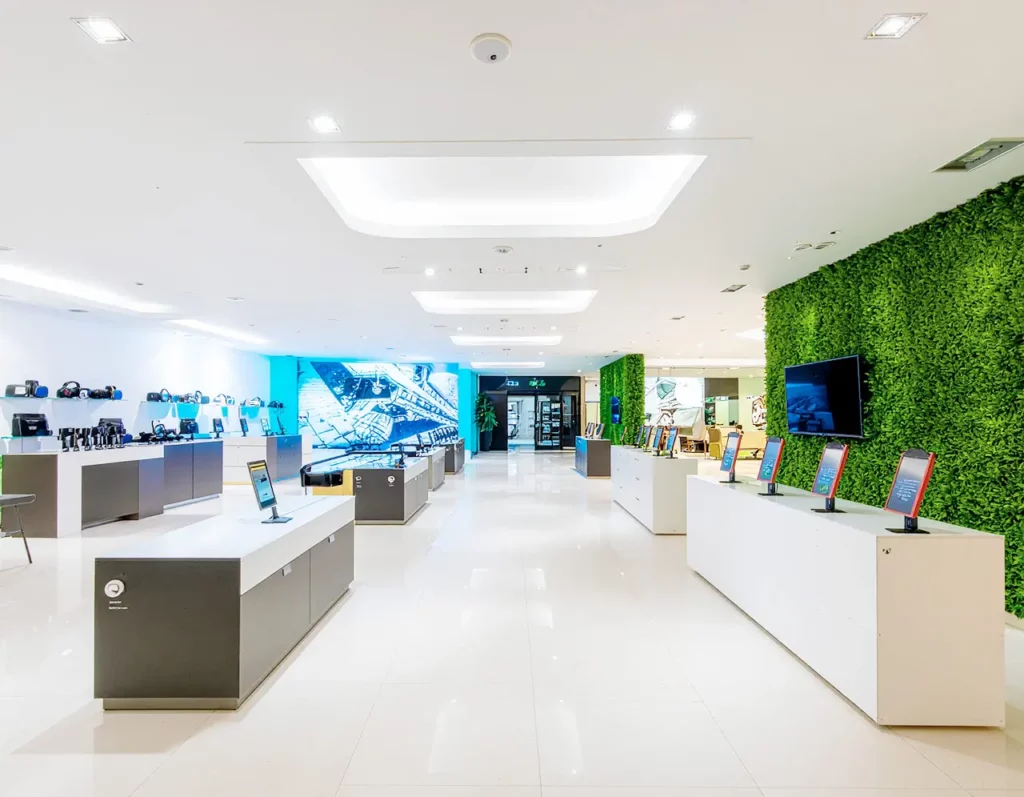Gen Z doesn’t just buy products—they look for experiences that reflect their digital identity and values. In a world where TikTok drives trends, authenticity is currency, and social media is an extension of the self, physical stores face a pressing challenge: they must be as dynamic, interactive, and shareable as the digital platforms that dominate Gen Z’s daily life.
Born between the mid-90s and early 2010s, Gen Z grew up with smartphones in hand. They’ve seen the evolution of digital retail and now expect physical stores to align with their fast-paced, hyper-connected, instant-gratification lifestyle.
Brands that understand and adapt to this mindset won’t just win sales—they’ll earn long-term loyalty.
What Does Gen Z Look for in a Physical Store?
Gen Z values immersive experiences, integrated technology, and spaces that foster community. According to a study by MG2, this group seeks curated visual merchandising and a genuine connection with brand values. It’s not just about the product—they want to know where it came from, how it was made, and what it says about them to wear or use it.
Gen Z doesn’t just buy products—they look for experiences that reflect their digital identity and values.

This generation also expects real innovation. A beautiful store is no longer enough—they need stimulation, interactivity, and opportunities to participate. Stores should act as meeting points, visual stages, and hubs for unique, in-person experiences that can’t be replicated online.
Key Elements of Store Design for Generation Z
1. Interactivity and Immersive Tech
Integrating technologies like augmented reality (AR) and virtual reality (VR) allows Gen Z consumers to interact with products in sensory, fun ways. A cosmetics brand might offer virtual try-ons via smart mirrors, while a fashion store could let shoppers see a 360° runway view of their outfit.

Touchscreens, immersive showroom-style experiences, and virtual assistants aren’t just gadgets—they’re tools that turn a routine visit into a memorable moment.
Gen Z values immersive experiences, integrated technology, and community-driven spaces.
2. ‘Instagrammable’ and Shareable Spaces
The store must be a perfect backdrop for TikTok or Instagram. This means paying close attention to aesthetics, colors, lighting, and even the messages on the walls. A single neon corner or catchy quote can make a store go viral.
Designated content-creation areas—lighted mirrors, projection zones, interactive installations—encourage shoppers to linger and share their visit, organically amplifying the brand’s reach.
3. Sustainability and Authenticity
Gen Z demands transparency. They want to know what materials are used, how products are made, and their environmental impact. A simple “eco-friendly” label won’t cut it—they want the full story, ideally presented in visual, interactive formats in-store.
Brands like Allbirds and Patagonia have nailed this by showing their manufacturing processes, certifications, and real commitments to sustainability.
Transparency in business practices and commitment to sustainability are essential for connecting with Gen Z.

They’re also hyper-aware of greenwashing. Brands that exaggerate or fake sustainability without visible proof risk losing trust permanently.
4. Personalization and Unique Experiences
Gen Z wants to feel unique. Offering customizable products on the spot (colors, messages, materials) gives them a sense of ownership and control. This can apply to sneakers, bags, gadgets, or apparel.
Exclusive in-store events—like workshops, influencer collabs, co-creation sessions, or rotating pop-ups—add freshness and novelty, encouraging repeat visits.
New Dynamics of Shopping and Community
For Gen Z, stores also serve as social hubs. Good design includes places to sit, engage, and connect. Coffee-style zones, stages for presentations, or content creation areas help drive foot traffic and increase dwell time.
They also expect personalized attention and purpose-driven storytelling. Sales staff should act more like hosts than clerks—offering guidance, conversation, and real human connection.
For Gen Z, shopping isn’t just a transaction—it’s an experience that must feel real, shareable, and aligned with their values.
Real-World Examples of Brands Connecting with Gen Z
David’s Bridal: Diamonds & Pearls
David’s Bridal launched a luxury boutique, Diamonds & Pearls, tailored for Gen Z brides who want premium design, personalization, and tech. It features minimalist spaces, interactive screens, and AI-powered assistants that personalize the shopping journey.
Roblox: Bridging the Virtual and Physical
Roblox goes beyond gaming, allowing brands to sell physical products inside its digital world. This turns online experiences into commercial opportunities—directly connecting with Gen Z in their favorite digital playground.
Oddli: Ethics, Style, and Community
Oddli embodies what Gen Z wants: sustainability, inclusive fashion, and real stories behind each item. Founded by two college students, the brand offers limited collections made from recycled materials and communicates honestly and transparently.
ESSX NYC: Concept + Community
ESSX NYC is more than a store—it’s a cultural platform. It blends cutting-edge design, emerging artist showcases, and an environment where visitors can explore, engage, and connect. Its modular layout allows for constant reinvention, keeping the space alive.
Conclusion
Designing physical stores for Generation Z goes far beyond decoration. It’s about building a brand ecosystem where experience, tech, community, purpose, and aesthetics come together. Every corner needs a reason to exist, a message that resonates, and real value.
Store design for Generation Z must go beyond traditional aesthetics, incorporating tech, sustainability, personalization, and community-focused spaces.
Meeting these expectations isn’t optional—it’s essential for any brand aiming to stay relevant. Gen Z doesn’t buy on impulse—they buy through connection.



